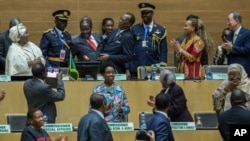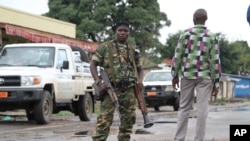At the African Union’s 26th Summit in Addis Ababa over the weekend, Burundi was a primary focus of the group’s agenda. During his opening remarks, U.N. Secretary-General Ban Ki-Moon urged action.
“In Burundi, I welcome your proposal to deploy human rights observers and to establish a protection and prevention mission,” said the secretary-general. “This crisis requires the most serious and urgent commitment from all of us,” Ban said.
But the African Union’s commissioner for peace and security, Smail Chergui, announced Sunday the bloc would not deploy a proposed 5,000 peacekeeping troops to Burundi.
Burundi President Pierre Nkurunziza, who did not attend the summit, and his government have warned deploying the troops would be viewed as an invasion of the country’s territory.
Instead, the African Union will send a high-level delegation to Bujumbura to discuss the possible deployment of peacekeepers. The mission's mandate would include the protection of civilians, disarmament of militia, seizure of illegal arms and protection of borders.
Political undertones seen
Kenya School of Law director PLO Lumumba voiced displeasure over the action, saying the African Union backtracked on a decision purely for political reasons.
“Because it is in many ways a statement to the rulers of Burundi that you can do what you want, and we will look the other way,” Lumumba said. “It is a sad thing that has happened in Addis Ababa,” Lumumba said.
The exiled leader of the Opposition Front for Democracy in Burundi, Jean Minani, agrees with Lumumba. He said Africa and the international community are turning their backs on Burundi’s people.
Minani said he believes other African leaders, some of whom he calls dictators, worry a peacekeeping force in Burundi may pave the way for similar forces coming into their own countries.
Lumumba agrees with that sentiment.
“Because there is a sense that they are protecting their own skin and they do not care about the people of Africa at all,” Lumumba said.
The African Union also presented its new chairperson, Chadian President Idriss Deby, who takes over from outgoing chair, Zimbabwe President Robert Mugabe.
The new chairman urged dialogue throughout the continent.
“In the cases of Burundi and South Sudan, the African Union must pursue its efforts so that we can find a way to peace very quietly and this depends immediately on (ending) violence,” said Deby. “We cannot allow thousands to die due to violence.”
Additionally, the African Union expressed its appreciation for those it called the “African heroes against Ebola” and officially closed its mission to West Africa, where it had sent 855 health workers to help fight the Ebola outbreak.





